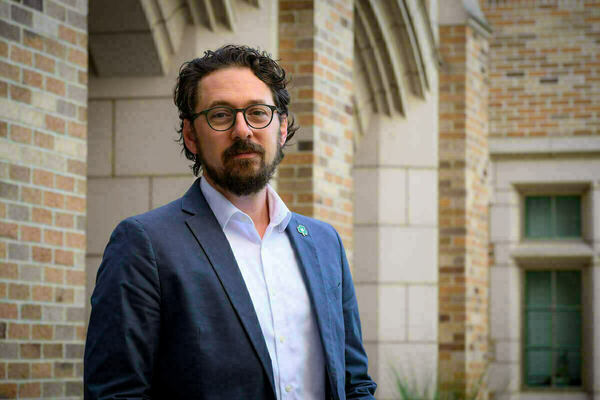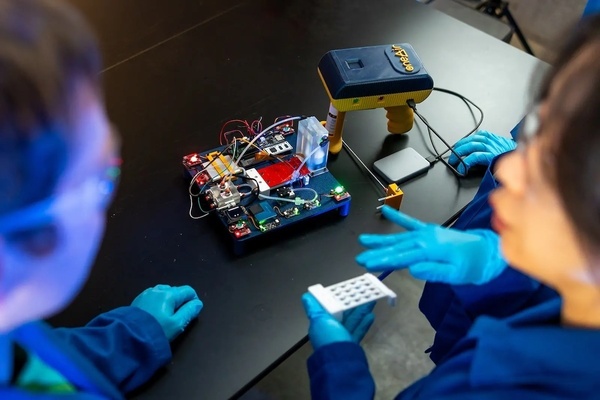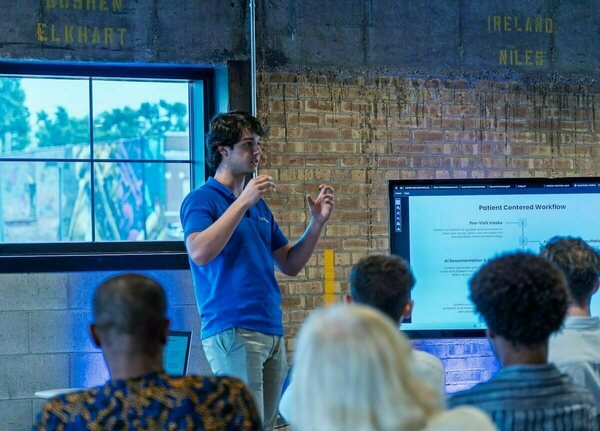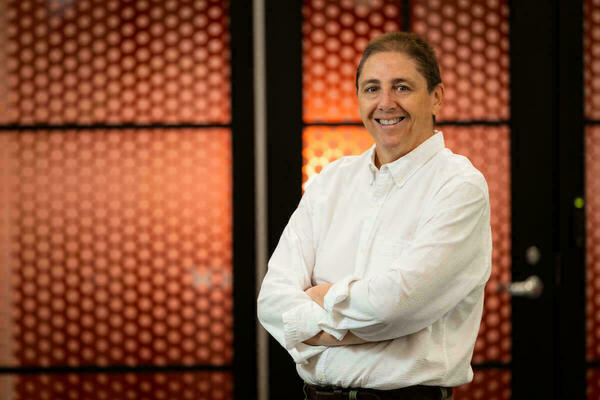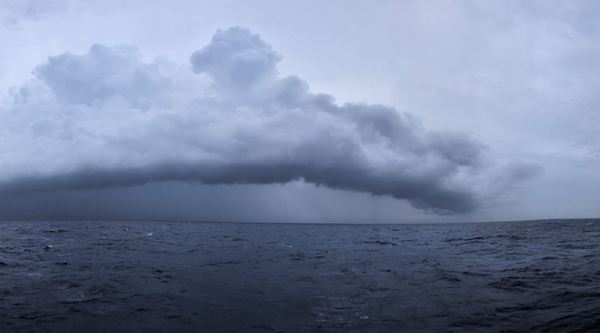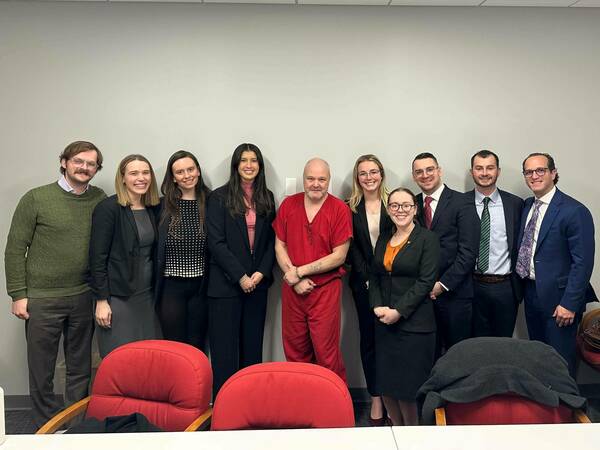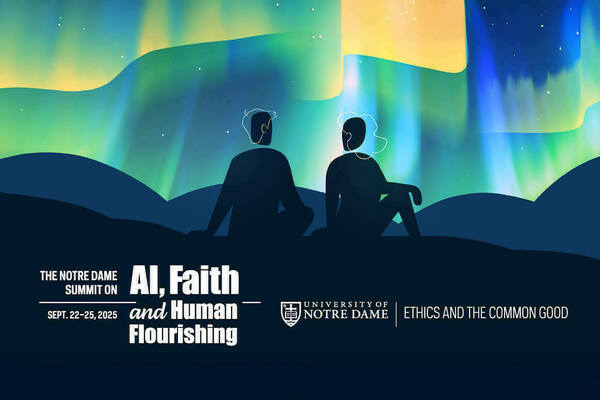Politics inspired Democracy Initiative managing director from early age
This is the first in a series of features highlighting the managing directors of the University's strategic initiatives. The managing directors are key (senior) staff members who work directly with the faculty directors to help implement and operationalize the vision for the initiatives, oversee initiative staff, and serve as thought partners for the faculty directors.
The summer that Joel Day’s father went to prison, he vividly recalls sitting on his grandfather’s lap and experiencing his very first political memory.
It was a sickly sweet summer day in southeast Missouri, and the California 6-year-old was staying with his Midwestern grandparents because his father’s sentence for drug trafficking left a trail of trauma in its wake. It also led to real financial struggles for his mother.
But Day remembers watching Bill Clinton’s 1992 speech accepting the Democratic nomination for president. Clinton talked about his own experience growing up without a father.
“I still remember the smell of the air and the room,” Day said. “Clinton looks at the camera and says, ‘I want to talk for a moment to the boys and girls growing up without a mom or a dad. This country cares about you. You have a future in this country.’
“And my granddad leans down and whispers in my ear, ‘He’s talking to you, son.’”
Day, the managing director of Notre Dame’s Democracy Initiative, said that moment sticks with him to this day because it reminds him that government has the potential to be “such a force for good in a really dire situation.” Yet as a scholar in political violence with a focus on the role of religion, he also recognizes how politics can lead to division and polarization, especially now.
“Notre Dame’s Catholic social teaching influences how we think about the values of democracy—that we are able to do amazing things that we care about through this vehicle of government,” Day said. “And so that’s really what connects here and my growing up.”
Day grew up in California, where his involvement in high school speech and debate and internships in the California State Assembly further fanned his interest in studying public policy. He earned his undergraduate degree from Point Loma Nazarene University before working on a presidential campaign in 2008.
He also worked at a nonprofit focused on ending human trafficking before returning to school for his master’s degree at the University of San Diego. In 2015, he earned his doctoral degree in international and comparative politics from the University of Denver.
Day said his background—as the rarity who has worked for both sides of the political aisle, and split time between academia and political practice—was an ideal preparation for his current role. The presidential campaign was for Gov. Bill Richardson, a Democrat, but Day also worked as a department director for a Republican mayor of San Diego.
“We are quite serious about the nonpartisan nature of the Democracy Initiative,” Day said. “There are very few people who have worked for both Republicans and Democrats, and I’m one of them.”
Before coming to Notre Dame last year, Day also served as a research fellow at the University of Southern California and a lecturer at the University of California San Diego. His most recent position was at Princeton University as a research director for its Bridging Divides Initiative. He has studied political violence in West Africa and Israel-Palestine, with a focus on how religion can either exacerbate or alleviate existing tensions.
“In academia, there is a deliberate and important disconnection between actually doing the thing and studying the thing, and there are really important reasons for that,” Day said. “But I think that when you are actually waking up every day and doing the work, it becomes part of who you are, your north star. That’s a different muscle group.”
Day said he came to Notre Dame because its whole-of-campus approach to democracy work differentiated it from places where that effort is siloed into the political science department or a single institute. He also wanted to work with world-class colleagues, including the initiative’s faculty director, David Campbell.
But mostly, he said his first visit to campus for interviews triggered a gut feeling that he’d only experienced when he knew he wanted to marry his wife and when his two kids were born.
“I felt this deep stirring inside of my body that was so strong that I couldn’t not notice it,” he said. “I’ve only experienced it a couple of times, and I’ve talked to a couple of priests who said that’s the Holy Spirit stirring in you, which might be true. What’s cool is that I experience it almost every day coming onto this campus to work.”
Day said the goals for the Democracy Initiative start with investing in students and in evidence-based scholarly work. The effort has already invested in 44 catalyst grants to more than 70 faculty members from across campus, ranging from the expected Kellogg Institute for International Studies and Rooney Center for the Study of American Democracy to less obvious areas such as computer science, math, and the arts. There have been prestigious faculty hires as well.
“We need to be very conscientious around the curation of work that we’re doing here—that we’re not seen as partisan, that we’re seen as rigorous, and that we are seen as a place of faith,” Day said. “And those things make Notre Dame a really trusted institution.”
In five years, Day said, he believes Notre Dame can strengthen its reputation as the best institution in the world for scholarship and student formation focused on democracy. But he also stressed the importance of bridging the gap between academia and the real world of public policy so that Notre Dame can fulfill its mission of being a force for good in the world by strengthening democracy.
That dual mission is not unlike the two sides of the Democracy Initiative managing director, who is now doing the work that first gave him hope.
“There’s the research and academia side of me and the public policy campaigns and administration side of things, and this role unifies both of those currents of my professional career,” Day said. “That’s the fullness of my career coming together, which is something that doesn’t happen every day, and I’m so thrilled to be here.”
Get involved
Learn more about the Democracy Initiative
Attend a Democracy Talks event
Originally published by at ndworks.nd.edu on September 08, 2025.
Latest Research
- Fighting for Better Virus DetectionAn electronic nose developed by Notre Dame researchers is helping sniff out bird flu biomarkers for faster detection and fewer sick birds. Read the story
- Notre Dame’s seventh edition of Race to Revenue culminates in Demo Day, a celebration of student and alumni entrepreneurship…
- Managing director brings interdisciplinary background to Bioengineering & Life Sciences InitiativeThis story is part of a series of features highlighting the managing directors of the University's strategic initiatives. The managing directors are key (senior) staff members who work directly with the…
- Monsoon mechanics: civil engineers look for answers in the Bay of BengalOff the southwestern coast of India, a pool of unusually warm water forms, reaching 100 feet below the surface. Soon after, the air above begins to churn, triggering the summer monsoon season with its life-giving yet sometimes catastrophic rains. To better understand the link between the formation of the warm pool and the monsoon’s onset, five members of the University of Notre Dame’s Environmental Fluid Mechanics Laboratory set sail into the Bay of Bengal aboard the Thomas G. Thompson, a 274-foot vessel for oceanographic research.
- Exoneration Justice Clinic Victory: Jason Hubbell’s 1999 Murder Conviction Is VacatedThis past Friday, September 12, Bartholomew County Circuit Court Judge Kelly S. Benjamin entered an order vacating Exoneration Justice Clinic (EJC) client Jason Hubbell’s 1999 convictions for murder and criminal confinement based on the State of Indiana’s withholding of material exculpatory evidence implicating another man in the murder.
- Notre Dame to host summit on AI, faith and human flourishing, introducing new DELTA frameworkThe Institute for Ethics and the Common Good and the Notre Dame Ethics Initiative will host the Notre Dame Summit on AI, Faith and Human Flourishing on the University’s campus from Monday, Sept. 22 through Thursday, Sept. 25. This event will draw together a dynamic, ecumenical group of educators, faith leaders, technologists, journalists, policymakers and young people who believe in the enduring relevance of Christian ethical thought in a world of powerful AI.



